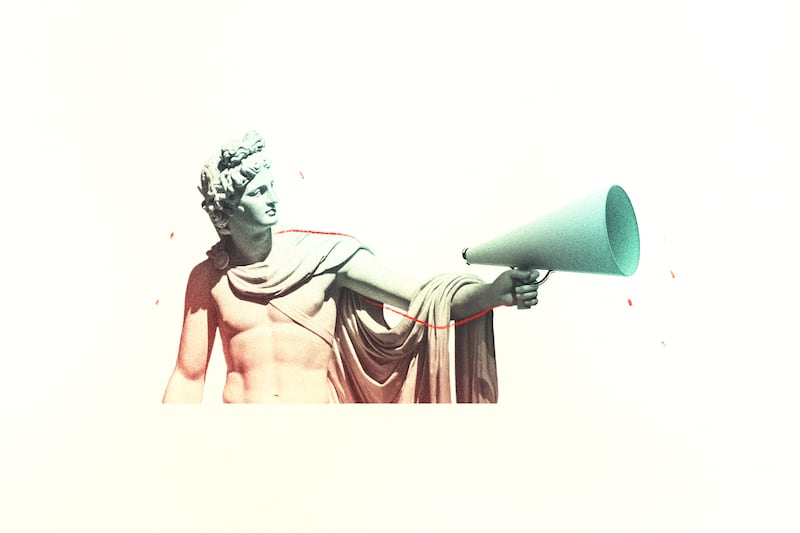A strong majority of Americans in both political parties, and across differences in age, race, income and gender agree: College students should hear from speakers with diverse points of view.
According to a new national poll conducted by HarrisX for the Deseret News, 84% of Americans agree it is important for colleges and universities to invite both liberal and conservative speakers to address and engage with students. A similar percentage of Republicans, 85%, and Democrats, 86%, agree with that statement.
Even on the question of whether students should listen to controversial speakers with diverse viewpoints, a majority of Democrats, 59%, agreed. An even higher percentage of Republicans, 73%, also agreed.
So why are colleges canceling speakers?

Do political leanings cause the disconnect?
When asked why — given the data showing most Americans want college students exposed to a variety of viewpoints — there are still many attempts on college campuses to shut down speech, one researcher said it’s in part because of the political makeup of college faculty.
“I think part of it is because the demographics on college campuses are different,” said Nathan Honeycutt, a research fellow at the Foundation for Individual Rights and Expression.
“It’s not just that faculty are left leaning, but the far left is over-represented among faculty compared to the general public. So I think that accounts for a big part of the mismatch because you have people who think differently and have different priorities,” said Honeycutt, who has his doctorate in psychology and has published research on political diversity and discrimination among university faculty and students.
Another reason Honeycutt pointed to is a shift in how colleges treat their students. He said colleges today see students more like “consumers” or “buyers,” so there is a greater need to appease the minority of students who oppose speakers.
“Sometimes (university administrators) just give in to that to try to avoid problems, but that option creates more problems, especially for public universities, because they’re not supposed to do those kind of things,” he said.
‘Disinvitation’ database
The foundation tracks campus speech cancelations in a “disinvitation database” on its website. It classifies campus cancellations three ways — a formal cancellation of an event by a college or university, a speaker withdrawing over student or faculty demands, and a “heckler’s veto,” or when a speaker attempts to speak but is shouted down.
It’s typically conservative speakers who face an attempt or outright cancellation on college campuses. So far in 2023, the Foundation for Individual Rights and Expression has tracked 17 cancellations or attempts at cancellations, with 16 of those coming from students or faculty on the political left directed at conservatives. In 2022, there were 32 attempts at cancellations, with 27 of those from the political left.
The most well-publicized recent cancellation was directed at federal Judge Stuart Kyle Duncan at Stanford Law School, when students interrupted his remarks by shouting him down and then an administrator failed to restore order and questioned whether Duncan should be allowed to speak on campus.
Duncan, considered a conservative jurist, was invited to campus by the Federalist Society.
The law school faced an immediate public backlash. In the aftermath, the dean of the law school, Jenny Martinez, wrote a 10-page memo where she reiterated the school’s commitment to free speech.
“Of course, protests are in some instances protected by the First Amendment, but the First Amendment does not give protesters a ‘heckler’s veto,’” she wrote.
Honeycutt said the event at Stanford was a clear example of students engaging in a heckler’s veto.
“I did see some students in the aftermath claiming that they were just expressing their free speech, but that’s not really free speech,” he said. “It’s not free speech when you’re silencing somebody else in the course of you speaking.”
When should students be punished?
In the Deseret News/HarrisX poll, respondents were asked what behavior students should be allowed to engage in when they disagree with a speaker on campus, and what behavior they should be punished for.
Both Republicans and Democrats strongly agreed that students should be allowed to write to school administrators, start a petition, engage in a social media campaign, or picket or protest outside an event when they disapprove of an invited speaker.
There was also agreement across the political spectrum that students should be disciplined for interrupting or shouting down a speaker during an event. The one area of disagreement was over student boycotts — 66% of Republicans said students should be punished for boycotting or walking out of class, while 58% of Democrats said they should be allowed to engage in that behavior.

Even though campus cancellations remain a problem, Honeycutt said he was encouraged by the poll’s findings.
“In an ideal world ... it would be great if universities could look at data like this and say, OK, wow, the American public is behind and supportive of students being exposed to different points of view, they think these things are important ... and we do see some schools starting to do that,” he said. “But it would be great if the trend could catch fire and spread more broadly.”


